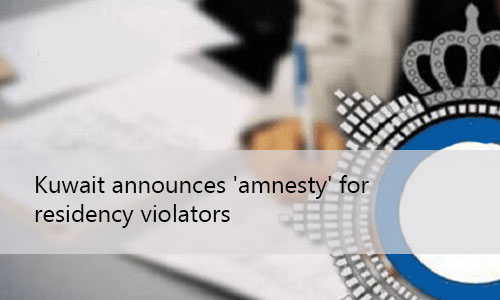

By Ben Garcia & Meshaal Al-Enezi
KUWAIT: Residency violators in Kuwait have been granted a 30-day period starting today to leave without paying fines or airfare, with the possibility of returning to the country later. Violators have been instructed to come directly to the designated processing venues in Farwaniya on specific dates depending on their nationality.
Illegal Filipino residents are the first on the list of expats to be given a chance to leave. The Philippine Embassy in Kuwait has published an advisory with regards to the procedures to be followed. "Undocumented Filipinos and those with absconding cases are encouraged to go to the following processing centers of the ministry of interior from April 1-5 from 8 am to 2 pm," the advisory reads. Males should proceed to Al-Muthanna Primary School for Boys (Block 1, Street 122) and females to Farwaniya Primary School for Girls (Block 1, Street 76) in Farwaniya.
"Amnesty applicants must bring their valid passports along with two pieces of luggage (20 kg each plus 7 kg hand carry bags). Those who have no valid passports should bring three passport-size photos with blue background," according to the advisory. Embassy officials at the venue will process the travel documents of Filipinos who need them.
"There is no need to visit the embassy, as an embassy booth will be there to assist our nationals," Charge d'Affaires Charleson Hermosura told Kuwait Times yesterday. "Once the applications are approved, amnesty grantees will not be allowed to leave the processing centers. They will be sent to the interior ministry's designated holding areas until their flight back to the Philippines," the advisory added.
Hermosura call upon all undocumented Filipinos to take advantage of the amnesty granted by the Kuwaiti government. "This is free for all illegals and the air tickets will be shouldered by the Kuwaiti government, so please take advantage of this amnesty," he said.
The ministry of interior has offered a one-month amnesty from April 1 to 30 to tens of thousands of expats living illegally in the country to leave without paying any fines and with the promise they will be allowed to return when the situation normalizes. The interior ministry has prepared 12 schools in the six governorates, six each for males and females, for such expats who prefer to go home. The ministry said that those who refuse to go will be penalized and denied reentry into the country.
Violators will be received from 8 am till 2 pm according to the following dates and nationalities: Philippines (April 1-5, 2020), Egypt (April 6-10), India (April 11-15), Bangladesh (April 16-20), Sri Lanka (April 21-25), other nationalities (April 26-30, 2020).
The manpower authority took part in a meeting the interior ministry held recently with representatives of various embassies and diplomatic missions designated in Kuwait to brief them on the latest developments concerning the amnesty granted to residents in violation of the residency law and accommodating them pending deportation to their home countries.
The ministry's assistant undersecretary for residency affairs Maj Gen Talal Maarafi explained how violators from over 11 expat labor centers desiring to benefit from the amnesty can apply to the temporary accommodation centers where they would be offered free meals pending deportation.
Manpower authority director Abdullah Al-Motoutah stressed that the authority works side by side with various state bodies, namely the interior ministry, to facilitate the procedures related to this decision. He urged embassy representatives to urge their nationals to seize the opportunity and benefit from the advantage of getting free tickets during the amnesty period without paying any fines, especially since the labor market is currently going through a recession due to the health situation.
"The law will be enforced and needed measures will be taken against violators remaining in the country after the amnesty concludes," Motoutah explained. The meeting was attended by diplomats from the embassies of Asian countries and of Egypt, Jordan, Lebanon, Iran and Ethiopia, who were all taken on a tour of the accommodation centers.
According to several MPs, between 150,000 and 200,000 expatriates are living illegally in the country. Authorities have been trying to facilitate the departure of as many expatriates as possible in order to reduce the pressure on the health system.

